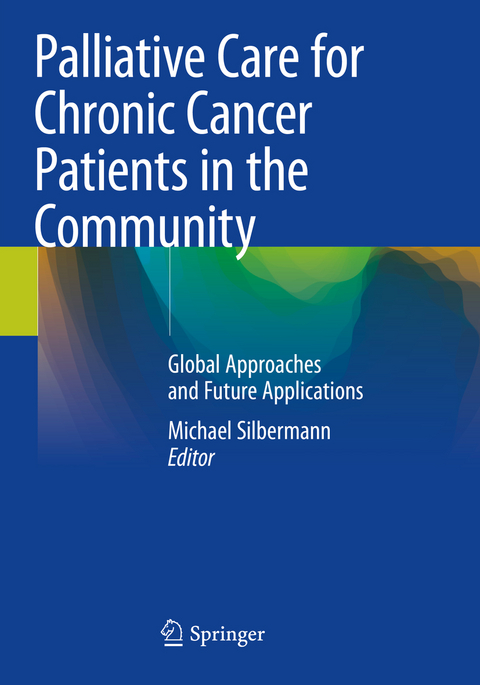
Palliative Care for Chronic Cancer Patients in the Community
Springer International Publishing (Verlag)
978-3-030-54528-4 (ISBN)
Unfortunately, despite advances in cancer care, a significant proportion of patients at home, experience sub-optimal outcomes. Barriers to successful treatment outcomes include, but are not limited to: access to oncologists in the primary health centers, non-adherence, lack of experienced oncology and palliative care nurses in the community, inadequate monitoring and the lack of training of family and pediatric physicians. Telemedicine approaches, including telephone triage/education, telemonitoring, teleconsultation and status tracking through mobile applications, have shown promise in further improving outcomes, in particular for chronic cancer patients following their hospitalization.
Lessons can be learned from existing hospices in North America, the United Kingdom, Australia, Centers of Excellence in African (Uganda) and modern community services in India (Kerala). An important goal of this book is to describe and encourage professionals to develop new community programs in palliative care, which include training and empowering physicians and nurses in the community on the principles of palliative care. The Middle East Cancer Consortium (MECC) together with the American Society of Clinical Oncology (ASCO) and the American Oncology Nursing Society (ONS) have conducted multiple courses ranging from basic palliative care to more specialized training in palliative care for multiple nationalities in Europe, Asia and Africa. Our experience clearly indicates that, to promote such activities, one needs strong leadership and confirmed political will to support the endeavor. The new book will emphasize the importance of having a core of multiple stakeholders including community leaders, government, NGOs and media to be actively involved in advocating for the cause and generating public awareness.
This text will provide the reader with a comprehensive understanding of the outside-of-the-hospital treatment of cancer patients by medical, paramedical and volunteer personnel. In doing so, this text will encourage the creation of new palliative care services improving upon the existing ones and stimulate further research in this field.
Part 1 of the text will begin with an overview of the current state of affairs of services provided to cancer patients while being cared for by primary health centers. It will also review the current literature regarding medical and psychological-based therapy options in the community for cancer patients at different stages of their disease. Part 2 will address the unique role of the community nurse, within the framework of the multidisciplinary team treating the patient, in the attempt to provide optimal evaluation and care in very challenging situations (such as with terminal patients). Part 3 will provide insightful models
lt;p>Michael Silbermann, PhD
Middle East Cancer Consortium
Haifa, Israel
The Role of the Palliative Care Team in Keeping Pediatric Oncology in Patients at Home.- Palliative Care: High Value, Low Revenue. A Comparison of Rwanda's Public Health Approach and the United States' Fee-For-Service System.- Progress Towards Artificial Intelligence-facilitated Palliative Care for Populations Everywhere.- Models of Community-Based Palliative Care.- The Role of the Nurse in the Palliative Care Community.- Understanding the Impact of Community-Based Palliative Care.- Palliative Care in a Multi-Cultural Society.- Hospice Experience in Guatemala - Our History.- From a Management Perspective on Barriers to Early Integration of Palliative Care in the Health Care System.- Palliative Care in Italy.- The Importance of the Interdisciplinary Team in Running Palliative Care Services in the Community.- Patients suffering from a Chronic, Irreversible illness: A Novel Study on the Psychological Intervention out of the Hospital.- Community Palliative Care in Spain: The CriticalRole of Nursing in its Development.- Collaborative Efforts in Developing Pediatric Oncology Palliative Care Services in the Hispano-American and African Countries.- The Development of Modern Models in the Community to Improve Quality of Life.- The Role of Routine Data and its Importance in Guiding Delivery of Community-Based Palliative Care Services.- Palliative Home Care in Poland- From an Idea at the Time of Political Changes to a Well-structured Integrated System.- Community Palliative Care in the Community: The Bosnian Experience.- Palliative Care Services in Croatia.- Current Status and Perspectives of Palliative and Supportive Care in Oncology in Montenegro.- Current State of Affairs: Palliative Care Services in Slovenia.- Management of Emergency in the Community and the Care of the Older Patient at Home.- The Critical Contribution of an NGO to the Development of Palliative Care Services in the Community: Encouraging Outcome of the Tanta Project in Egypt.- Republic of Sudan: Palliative Care - Hope for the Future.- Cancer and Palliative Care in Morocco.- International Program of Pediatric Oncology Palliative Care in Morocco: The Soleterre Foundation Experience.- Provision of Palliative Care Services for Cancer Patients in the Community in Africa.- Current State of Palliative Care in Uganda.- Palliative Care: High Value, Low Revenue. A Comparison of Rwanda's Public Health Approach and the United States' Fee-For-Service System.- Palliative care in Rural Central Africa, Experiences from Cameroon.- A Public Health Approach to Palliative Care.- Collaboration between Palliative Care and Oncology Services: Global Models and the Example of Cyprus.- Community-Oriented Palliative Care in Iran.- Palliative Care in Iraq: Background and Improving Services.- Pediatric Oncology Palliative Care Services in the Community: Northern Israel.- Palliative Care Services to Cancer Patients in Jordan.- The Role of the Physician in Running a Palliative Care Service in the Community: The Lebanon Experience.- Palliative Care in Lebanon; From Inception to Implementation.- AL-Sadeel Society for Palliative Care: A Model for Civil Involvement in Promoting Palliative Care Services in the Community.- Pediatric Oncology Palliative Care in the Community: Turkey.- The Role of the Community Nurse in Developing Palliative Care Services in the Community.- Caring for the Cancer Patient in the Community: In Mind, Body and Spirit.- Prevalence and Management of Cancer Pain in Developing Countries.- Palliative Care: The Care that is Rarely Practiced by Health Care Professionals in Afghanistan.- Palliative Care for Cancer Patients in Armenia: A Silent Pain.- Embracing the Challenge of Integrating Palliative Care Services into the Healthcare System in Times of Reform: The Kazakhstan Experience.- Provision of Palliative Care for Oncology Patients in Pakistan: A Review of Challenges and Current Practices.- Collaborative Programs between Government and Civil Society - Scope, Challenges and Models.- The Role of the Palliative Care Team in Keeping Pediatric Oncology Patients at Home.- Experiences in Extending Palliative Care to Neuro-Oncology Patients in Indonesia.- Experiences in Extending Palliative Care to Neuro-Oncology Patients in Indonesia.- Establishment of Home-Based Pediatric Palliative Care - The Indonesian Experience.- Network of Primary Palliative Care in Thailand: A Prototype Driven by Education.- Community Hospice Care for Cancer Patients in China.- A Place of Treatment and Transitional Care for Cancer Patients in Japan.- Palliative Care Development in Viet Nam: Increasing Access and Challenges.- Photodynamic Therapy and Fluorescence Imaging Diagnostics and its Application to Cancer Care .- Community-Based Palliative Care in the Philippines.- A Public Health Approach to Palliative Care.- Palliative Care Provision in Rural New Zealand.
| Erscheinungsdatum | 02.11.2021 |
|---|---|
| Zusatzinfo | XXIX, 599 p. |
| Verlagsort | Cham |
| Sprache | englisch |
| Maße | 178 x 254 mm |
| Gewicht | 1185 g |
| Themenwelt | Medizin / Pharmazie ► Medizinische Fachgebiete ► Onkologie |
| Medizin / Pharmazie ► Medizinische Fachgebiete ► Palliativmedizin | |
| Schlagworte | Cancer care in developing countries • cancer care in regions of political and military conflicts • cancer care in the middle east • improving global health care • Interdisciplinary Cancer Team |
| ISBN-10 | 3-030-54528-8 / 3030545288 |
| ISBN-13 | 978-3-030-54528-4 / 9783030545284 |
| Zustand | Neuware |
| Informationen gemäß Produktsicherheitsverordnung (GPSR) | |
| Haben Sie eine Frage zum Produkt? |
aus dem Bereich


